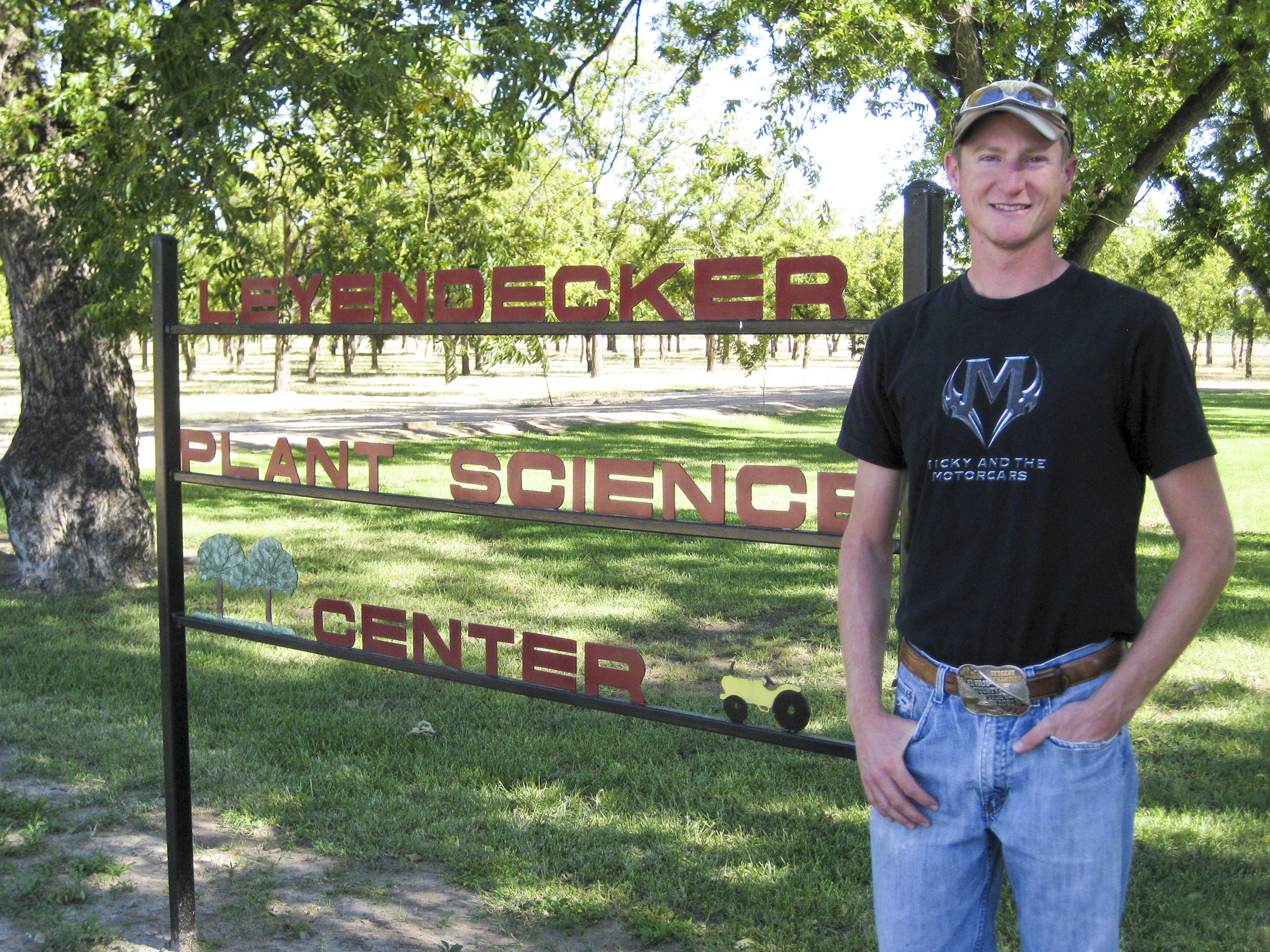NMSU alumnus selected to manage Leyendecker

Leyendecker Plant Science Research Center is a 200-acre farm southwest of Las Cruces, where New Mexico State University researchers conduct experiments to help producers in the state to "do the most with the least."
That, according to Dave Lowry, Leyendecker's new manager as of mid-July, is one of the most important services agriculture researchers at the state's land-grant institution can provide.
"Our main focus is research to benefit commercial and industrial agriculture of New Mexico, to really give back to the producers of the state, to do the most with the least," Lowry said. "We have many breeding programs that are formulated for this particular climate, here in the Southwest, to increase yields while minimizing inputs. And, to withstand the severe droughts and harsh conditions the Southwest brings."
Leyendecker is currently growing pecans, alfalfa, onions, lettuce and, of course, chile.
"We also do some trials on sesame, sugar beets and pinto beans," Lowry said. "We really dabble in a little bit of everything. We even have shrimp growing on the farm. Leyendecker really encompasses a broad aspect of agriculture."
Lowry started his job at Leyendecker in July, but knows the Mesilla Valley well, as he grew up in Mesilla, N.M., where he has his own custom farming operation. He also is a proud graduate of New Mexico State University.
"I find it interesting collaborating with the researchers - what the main focus of their experiment is, what they're trying to do with it, and also, what comes of it," Lowry said.
One unique project underway at Leyendecker is the cotton-shrimp project, sponsored by Cotton Incorporated. NMSU researchers are developing shrimp feeds from glandless cottonseed meal, and with that, growing shrimp from the post-larval stage to maturity in large indoor pools.
Lowry said people often appear confused when they hear that NMSU is growing shrimp in the desert.
"After we explain what we're trying to tie in with the cotton program and Cotton Incorporated, people seem to understand that concept that we're trying to bring full circle," he said. "Sustainability is a buzzword nowadays, and when we try to explain to them what we're trying to do, it kind of all makes sense then, but there's always that initial shock value."
Lowry recommended several immediate changes when he started managing Leyendecker, including hiring an administrative assistant to help with office tasks and upgrading equipment and implements.
"We have just purchased a John Deere 7200R tractor. It's a brand new 2013, and it has four-wheel drive capabilities that we were lacking in a bigger horsepower tractor here," Lowry said. "It has all of the bells and whistles and with that, it has the possibility of a guidance system."
The new tractor's co-pilot seat will allow NMSU students the opportunity to observe and learn from experienced operators, preparing them with the knowledge and skills potential employers will expect them to have upon graduation. The guidance system maps fields, based off a tower system in the valley, telling the operator how long it will take to perform a specific process - whether plowing, cultivating, etc., and also keeps the rows perfectly straight.
"All the operator is in charge of is turns. And then you push an auto track button and it lines you out and does the rest for you," Lowry said. "It's really almost error-proof other than the turns. It increases efficiency, it reduces time, which in turn, reduces your fuel consumption, which all goes back to the environment and sustainability, reducing your footprint."
NMSU purchased the John Deere 7200R from South Plains Implement, but also has partnered with South Plains Implement to provide state-of-the-art, hands-on training on five other John Deere tractors at Leyendecker, Fabian Garcia Science Center and the Department of Animal and Range Sciences.
"Some of our students may be going to industry and working on large farms," said Tracey Carrillo, assistant director of campus farm operations. "This training on GPS auto track technology and new tractors will be a resume advantage for them."
"Farmers are stewards of the land, and that's our main goal, to leave the land better than we found it," Lowry said. "It's amazing what technology can do to help such an old-fashioned practice."
Lowry welcomes interested parties to schedule tours of Leyendecker by calling 575-646-2281 and asking for himself or Autumn Martinez.
"Anyone is more than welcome to come out to Leyendecker and tour the farm and see what we're doing out here and why we're doing it, and also what kinds of results we're getting," he said. "It is a public institution; it's for the state of New Mexico, and the producers and consumers of the state of New Mexico. Our doors are always open."


